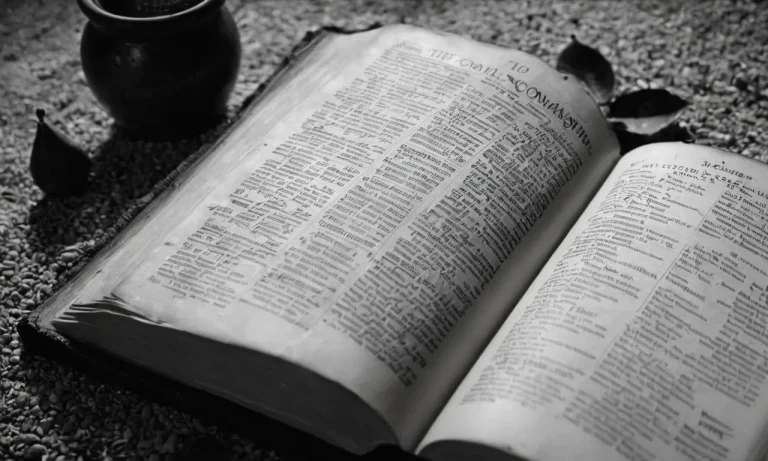How Old Was David When He Died In The Bible?
King David is one of the most well-known figures in the Bible. His life story is full of intrigue, drama, triumph, and tragedy. As a young shepherd boy, he slayed the giant Goliath and later became king of Israel. He was known as a man after God’s own heart, but also committed grievous sins.
David’s life illustrates the heights of human achievement and the depths of human failure. He left an enduring legacy as an inspiring leader, skillful musician, and prolific writer of many Psalms. But at the end of his life, one question remains – how old was David when he died?
If you’re short on time, here’s a quick answer to your question: based on details in the Bible, scholars estimate David was around 70 years old when he died.
Details of David’s Age at Death in the Bible
David Reigned as King for 40 Years
The Bible tells us in 2 Samuel 5:4 that David was 30 years old when he became king over Israel and Judah. He then reigned as king for 40 years, as stated in 1 Kings 2:11. Therefore, we know with certainty that David ruled as king from age 30 to age 70, a total of 40 years.
David Was 30 Years Old When He Became King
As mentioned above, 2 Samuel 5:4 clearly states that “David was thirty years old when he began to reign.” This gives us the starting point for calculating how old David was when he died – 30 years old at the beginning of his reign.
Scholars Deduce David’s Age at Death Around 70
Given that David became king at age 30, and we know from 1 Kings 2:11 that he reigned for 40 years total, simple math allows us to deduce that David was around 70 years old when he died. 30 + 40 = 70. Although his exact age is not stated explicitly, scholars agree that based on these details in Samuel and Kings, David was approximately 70 years old at the time of his death.
Key Events in David’s Life
Anointed as Future King
As a young boy, David was anointed by the prophet Samuel to be the future king of Israel, replacing Saul who had disobeyed God (1 Samuel 16:1-13). This was a pivotal moment marking David’s destiny to one day rule over the nation.
Though he returned to tend sheep after this ceremony, the spirit of the Lord came powerfully upon David from that day forward.
Killed Goliath as a Youth
When David was still a youth tending his father’s sheep, he killed the Philistine giant Goliath with just a sling and stone (1 Samuel 17). By boldly challenging this intimidating foe when no Israelite soldier dared, David displayed tremendous courage and faith.
His defeat of Goliath brought him great fame in Israel. King Saul then kept David by his side, though he later became jealous of David’s military victories.
Became King after Saul’s Death
After Saul and Jonathan were killed in battle against the Philistines, David was anointed king over the tribe of Judah at Hebron (2 Samuel 2:1-4). A power struggle ensued as Saul’s son Ish-Bosheth was made king over the rest of Israel by Abner.
After Abner later defected to David’s side, Ish-Bosheth was assassinated, allowing David to finally become king over a united Israel at the age of 30 (2 Samuel 5:4-5).
Conquered Jerusalem and Brought the Ark
Now ruling from Jerusalem after capturing it from the Jebusites, one of David’s first acts as king was to transport the Ark of the Covenant there from Kiriath Jearim (2 Samuel 6-7). Though Uzzah was struck dead when he improperly touched the ark, David persisted in bringing it to Jerusalem, dancing joyfully as the symbol of God’s presence came into the city.
This showed David’s zeal to elevate Jerusalem’s status as a center of worship.
Committed Grievous Sins
Sadly, David severely tarnished his legacy by committing adultery with Bathsheba and then having her husband Uriah sent to the frontlines to die (2 Samuel 11). This abuse of power represented a drastic moral failing and set in motion severe consequences.
Though David repented, the prophetic rebuke of Nathan informed him that violence and rebellion would continually plague his house thereafter.
Punished for Taking a Census
In David’s later years as detailed in 2 Samuel 24, he ordered a census to be taken, numbering the fighting men of Israel. This act of pride and reliance on human strength rather than God brought judgment.
After being given a choice of punishments by God, David chose a 3-day plague resulting in 70,000 Israeli deaths. David observed the angel of destruction and repented, purchasing the site of Araunah’s threshing floor to offer sacrifices and end the plague.
David’s Last Days and Death
David’s Health in Decline
In his old age, King David’s health began to deteriorate. The Bible describes how David “was old and advanced in years” and that “they covered him with clothes, but he could not get warm” (1 Kings 1:1).
This perhaps indicates that David was struggling with poor circulation and feeling chronically cold – telltale signs of aging and failing health.
We are not given the exact age that David died, but many scholars estimate he was around 70 years old. After a lifetime of battling Israel’s enemies in wars, living as a fugitive, enduring family turmoil with his children, and the daily stresses of governing a kingdom, David’s body and stamina were understandably in decline.
Appointed Solomon as Successor
Recognizing that his death was near, David moved to secure the succession of his son Solomon to the throne. Solomon was one of the many sons born to David by his many wives during his 40-year reign, but the Bible makes clear that it was Solomon who David intended to rule after him.
David charged Solomon to “walk in God’s ways” and “do what the LORD your God requires: walk in obedience to him, and keep his decrees and commands, his laws and regulations” (1 Kings 2:3). David gathered together the leaders of Israel and had them formally anoint and appoint Solomon as the new king over Israel (1 Chronicles 29:22).
Died after 40-Year Reign
The Bible records succinctly that David “died in a ripe old age” (1 Chronicles 29:28). His reign over Israel had lasted 40 years – 7 years as king over Judah from Hebron and 33 years over all Israel from Jerusalem (1 Kings 2:11).
When he died around age 70, David was buried “with his ancestors” in the City of David, likely heir tombs in a burial complex on the hill southeast of Jerusalem’s walls (1 Kings 2:10). Though long dead, David remains legendary among the Jewish people and billions of believers worldwide as a famous Bible hero, the man after God’s own heart.
David’s Enduring Biblical Legacy
Hailed as a Model King
David is extolled as one of the greatest kings in the Old Testament. He united the 12 tribes of Israel into a cohesive kingdom and established Jerusalem as the capital. Under his rule, Israel prospered economically and militarily.
As a warrior-king, David led his troops to victory against the Philistines and expanded the borders of his realm. His military exploits are legendary, cementing his status as an archetypal king that subsequent rulers tried to emulate.
As a model king, David also instituted religious reforms, bringing back the Ark of the Covenant to Jerusalem. This affirmed the city as the religious center of the nation. David is additionally credited for organizing the priestly families and establishing a centralized form of worship in Israel.
His kingdom represented thegolden age of ancient Israelite history.
Known for Deep Faith Despite Failures
For all his accomplishments, David experienced profound moral failings. He committed adultery with Bathsheba and engineered her husband Uriah’s death to cover up the affair. The prophet Nathan called out David for his grievous sins.
Yet despite such egregious failures, David responded with sincere contrition before God. His penitential Psalm 51 is regarded as a model prayer of a repentant heart. His deep faith enabled him to own up to his mistakes, accept divine chastisement, and receive God’s forgiveness.
Prolific Writer of Psalms
The Book of Psalms contains over 70 psalms ascribed to David. These poetic hymns and prayers cover the whole spectrum of human emotions – from exuberant praise to agonized lamentation. Through these inspired writings, David gave voice to the longing of the soul for God.
For this reason, his psalms have universal appeal spanning across cultures and centuries. Believers through the ages have found solace and strength by praying and singing his beautiful psalms.
| Total psalms in the Book of Psalms | 150 |
| Psalms attributed to David | Over 70 |
Ancestor of Jesus Christ
The Gospels of Matthew and Luke record the genealogy of Jesus, tracing his lineage back to King David. God’s promise to establish the throne of David forever is fulfilled in Jesus, the Messiah descendant of David.
The angel Gabriel proclaimed to Mary that her son Jesus would inherit “the throne of his father David” and reign over Israel forever (Luke 1:32-33). As the ideal Davidic King, Jesus fulfilled the messianic prophecies rooted in the Davidic covenant.
In light of Jesus’ Davidic pedigree, early Christian preachers like Paul and Peter prominently featured David in their gospel proclamation. They presented Jesus as the heir apparent to David’s throne who has come to restore David’s fallen kingdom (Acts 13:22-23).
The enduring legacy of David thus culminates in his most renowned descendant – Jesus the Messiah.
Conclusion
In conclusion, though the Bible does not explicitly state David’s age at the time of his death, scholars have analyzed the Scriptural accounts to estimate he was around 70 years old. After ruling for 40 years as king over Israel, David died of natural causes, appointing his son Solomon to succeed him.
Though far from perfect, David left an enduring legacy of leadership, faith, beautiful poetry, and as an ancestor in the lineage of Jesus Christ. His life stands as an imperfect but inspiring Biblical example of human potential and the redemption found in God.








